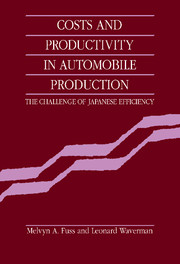Book contents
- Frontmatter
- Contents
- Preface
- Chapter 1 Introduction
- Chapter 2 International differences in output, productivity, and wages in the automobile industry: the 1950s to the mid-1980s
- Chapter 3 The cost-function approach to the analysis of cost and total factor productivity differences
- Chapter 4 Data base sources and method of construction
- Chapter 5 Empirical results: estimation of the cost function
- Chapter 6 Productivity growth in the automobile industry, 1970–1984: a comparison of the United States, Japan, Germany, and Canada
- Chapter 7 International comparisons of automobile industry cost and productivity levels: Japan, Germany, and the United States
- Chapter 8 International comparisons of automobile industry cost and productivity levels: Canadian with U.S., Japanese, and German production
- Chapter 9 Summary and conclusions
- References
- Index
Chapter 1 - Introduction
Published online by Cambridge University Press: 16 October 2009
- Frontmatter
- Contents
- Preface
- Chapter 1 Introduction
- Chapter 2 International differences in output, productivity, and wages in the automobile industry: the 1950s to the mid-1980s
- Chapter 3 The cost-function approach to the analysis of cost and total factor productivity differences
- Chapter 4 Data base sources and method of construction
- Chapter 5 Empirical results: estimation of the cost function
- Chapter 6 Productivity growth in the automobile industry, 1970–1984: a comparison of the United States, Japan, Germany, and Canada
- Chapter 7 International comparisons of automobile industry cost and productivity levels: Japan, Germany, and the United States
- Chapter 8 International comparisons of automobile industry cost and productivity levels: Canadian with U.S., Japanese, and German production
- Chapter 9 Summary and conclusions
- References
- Index
Summary
One of the most important factors determining the health of any national economy is the level and pattern of international trade. For Canada, Germany, Japan, and the United States, motor vehicles are prominent among the flows of exports and imports. The trade flows in vehicles among these countries are heavily influenced by the relative competitiveness of the production processes for automotive manufacturing. International cost-of-production differentials are determined by differences in factor prices and, in the long run, by productivity differences. These differences can reflect true comparative advantage or can, to some extent, be contrived by government fiscal policies (“industrial policy” such as taxes and subsidies) and other policies affecting the exchange rate. The private sector may also distort measured comparative advantage through transfer pricing and other decisions internal to multinational firms.
Trade policy is often formulated in response to employment and price pressures caused by international cost differences; tariff barriers and quotas are obvious examples. The United States, Canada, and most European countries have placed import quotas on Japanese automobiles in response to the apparent cost disadvantage of domestic producers. The Canada–U.S. Auto Pact, which is a form of industrial policy, was designed to encourage North American producers to eliminate the Canadian productivity disadvantage through the rationalization of production facilities.
Trade and industrial policies can be thoughtfully analyzed only if knowledge is available about existing levels and sources of cost and productivity differentials.
- Type
- Chapter
- Information
- Costs and Productivity in Automobile ProductionThe Challenge of Japanese Efficiency, pp. 1 - 16Publisher: Cambridge University PressPrint publication year: 1992



